In New Zealand, we have an aim, set by the Ministry of Health, that people with disabilities are able to live in their homes and participate in their communities as other New Zealanders do.
We also have a Code of Health and Disability Services Consumers' Rights that outlines the rights and duties of both consumers and health providers to ensure everyone is treated with respect, dignity, to be fully informed and much more. If your rights have been breached, you can make a complaint.
Low or no data? Visit zero.govt.nz, scroll down the page then click on our logo to return to our site and browse for free.
Disability services
Key points about disability services
- People with disabilities have access to specialist services to support them to live in their homes and participate in their communities.
- Like all health consumers and providers, you also have rights under the Health and Disability Code of Rights.
- Tis page provides an overview of disability services available for different people, the New Zealand Disability Strategy and how to access disability services in your area.
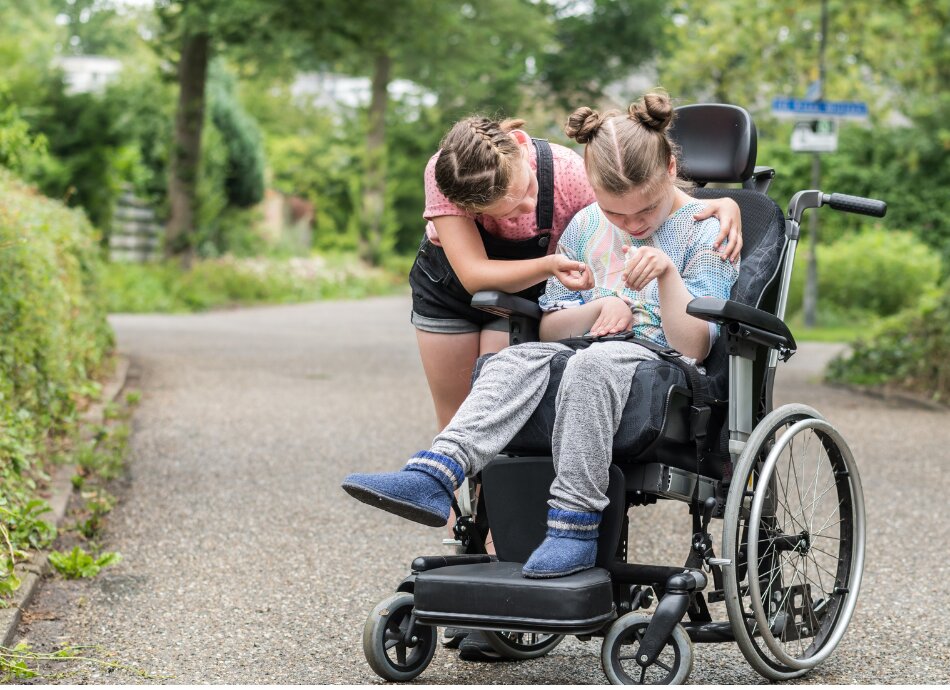
Disability Support Services plans and funds disability support services and administers the Intellectual Disability (Compulsory Care and Rehabilitation) Act 2003.
To contact Disability Support Services, call free on 0800 DSD MOH (0800 373 664) or email disability@moh.govt.nz.
To learn more about the following areas, visit the Ministry of Health website:
- Equipment and modification services(external link) provide free or subsidised equipment and modifications to people with disabilities
- Intellectual Disability Act 2003(external link)
Each region has a number of Māori provider organisations offering services for Māori that can provide services specifically for Māori who have a disability.
Visit the Māori health provider map and directory(external link) to find services near you.
There are Pasifika provider organisations offering services for Pasifika who have a disability and have services specifically for Pasifika throughout New Zealand. Contact your local medical clinic to find out what services are near you.
Faiva ora – national Pasifika disability plan(external link)
The Total Mobility scheme is a discount transport service provided for people who are unable to use public transport easily or who have mobility impairments. The Total Mobility scheme is funded by local and central government and is provided in the form of subsidised door to door transport services. Read more about the Total Mobility scheme, including what services are available in your region.
The NZ Disability Strategy was developed to guide the work of government agencies on disability issues from 2016 to 2026. It is the government’s vehicle for meeting Aotearoa New Zealand's obligations under the United Nations Convention on the Rights of Persons with Disabilities (UNCPRD).
Click here(external link) to read or download the NZ Disability Strategy in a range of accessible formats, or find a link in the Learn More section below.
What is the vision of the NZ Disability Strategy?
The vision is that New Zealand is a non-disabling society – a place where disabled people have an equal opportunity to achieve their goals and aspirations, and all of New Zealand works together to make this happen.
The strategy has three sets of principles and two approaches to help implement it.
Principles and approaches of the NZ Disability Strategy
The principles and approaches help make sure the disabled community is visible, acknowledged and respected on an equal basis with others, and that disabled people can live a life with dignity and feel valued.
The three principles are:
- Te Tiriti o Waitangi
- the Convention on the Rights of Persons with Disabilities
- ensuring disabled people are involved in decision-making that impacts them.
The two approaches are:
- investing in our whole lives – a long-term approach
- specific and mainstream services – a twin-track approach.
Outcomes of the NZ Disability Strategy
The strategy identifies 8 outcome areas that will contribute to achieving the vision, as follows:
Outcome 1 – education
- We get an excellent education and achieve our potential throughout our lives.
Outcome 2 – employment and economic security
- We have security in our economic situation and can achieve our full potential.
Outcome 3 – health and wellbeing
- We have the highest attainable standards of health and wellbeing.
Outcome 4 – rights protection and justice
- Our rights are protected, we feel safe, understood and are treated fairly and equitably by the justice system.
Outcome 5 – accessibility
- We access all places, services and information with ease and dignity.
Outcome 6 – attitudes
- We are treated with dignity and respect.
Outcome 7 – choice and control
- We have choice and control over our lives.
Outcome 8 – leadership
- We have great opportunities to demonstrate our leadership.
Figure 1 below outlines the Strategy’s framework. 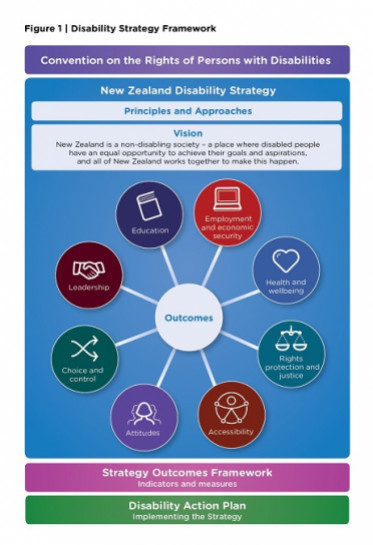
Disability Action Plan 2019–2023
Four-yearly disability action plans are developed as the government’s vehicle for implementing the Strategy. The current Disability Action Plan 2019–2023 is not a conventional action plan, in that it does not consist of a series of work areas followed by lists of actions. Instead, it is a package of 25 cross-government work programmes that are underway or are being planned that have an explicit disability perspective.
The Action Plan has been designed this way to bring together important programmes of work that agencies have committed to that relate to the outcomes in the Disability Strategy. It responds to the main issues identified by disabled people, the Disabled People’s Organisation Coalition and government agencies working together.
Outcomes and work programmes
The work programmes are listed under the relevant outcome in the Disability Strategy.
Education
Ministry of Education’s Education Work Programme includes but is not limited to:
- Early Learning Strategic Plan
- Tomorrow’s Schools Review
- NCEA Review
- Review of Vocational Education
- Curriculum, Progress and Achievement
- Learning Support Action Plan.
Tertiary Education Commission:
- Improve outcomes for disabled learners.
Employment and economic security
Ministry of Social Development:
- Disability Employment Action Plan
- Employment of disabled people in the public sector
- National Information Hub and Regional Networks.
Ministry of Social Development and the Ministry of Business, Innovation and Employment:
- Replacement of Minimum Wage Exemption.
Health and wellbeing
Ministry of Health:
- Repeal and replace the Mental Health (Compulsory Assessment and Treatment) Act 1992 with legislation aligned to the UNCRPD
- Improve access to quality healthcare and health outcomes for disabled people
- Explore the framework that protects the bodily integrity of disabled children and disabled adults against non-therapeutic medical procedures
- Funded Family Care policy change.
Ministry of Health and the Department of Corrections:
- Reduce the use of seclusion and constraint.
Sport New Zealand:
- Play, Active Recreation and Sport Action Plan for Disability.
The Office for Seniors:
- Better Later Life – He Oranga Kaumātua 2019–2034.
Accessibility
Ministry of Social Development:
- Accelerate Accessibility (including the role of accessibility legislation)
- Accessibility of Public Information.
Ministry of Housing and Urban Development and Housing New Zealand:
- Improve accessibility across the New Zealand housing system.
New Zealand Transport Agency:
- NZTA Action Plan.
Ministry of Transport:
- Ministry of Transport Action Plan.
Office for Seniors:
- Age-friendly Aotearoa/New Zealand.
Leadership
Office for Disability Issues:
- Nominations Database.
New Zealand Transport Agency:
- Improve understanding and decision-making with the disabled community.
Other work programmes will also impact on the leadership outcome.
Choice and control
Ministry of Health:
- System Transformation.
Ministry of Social Development:
- Develop guidance on the effective use of Supported Decision-making.
Rights protection and justice
Ministry of Justice with other justice sector agencies:
- Improve justice services so that they are accessible and able to be understood by disabled people.
Attitudes
New Zealand Transport Authority:
- Disability awareness education for bus drivers.
Other work programmes will also impact on the attitude outcome.
Learn more
NZ Disability Strategy(external link) Office for Disability Issues, NZ
NZ Disability Strategy in different formats: large print(external link), easy read(external link), audio(external link), NZSL(external link)
Disability action plan 2019–2023(external link) Office for Disability Issues, NZ
Alternate versions of the disability action plan 2019–2023(external link) Office for Disability Issues, NZ
Te Mahere Mahi Hauātanga 2019–2023(external link) Office for Disability Issues, NZ
Transformative change for disabled people, tāngata whaikaha Māori, families and whānau is promised under a new Ministry for Disabled People that is set to reform the disability system in Aotearoa New Zealand.
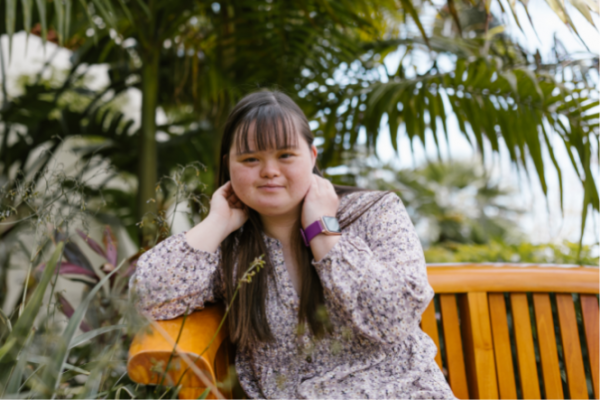 Image credit: Canva
Image credit: Canva
The new Ministry is designed to replace the currently fragmented system where there is no single agency responsible for driving improved overall outcomes for people with disabilities. Instead, all disability supports and services will be joined up, in line with the Enabling Good Lives(external link) (EGL) vision and principles. Enabling Good Lives pilots in Christchurch, Waikato and MidCentral regions empower people with disabilities and their families to have more control and choice about the support they receive.
Putting the voice of people with disabilities and their families at the heart of decision making is key. An associated Accessibility Governance Board will be led by, and represent, disabled people and whānau aiming to integrate disabled communities’ voices into all levels of decision-making – from the formation and running of the Ministry, to the development of accessibility legislation.
The new Ministry will be hosted by the Ministry of Social Development, to make sure there is shared access to existing services and knowledge. It aims to:
- drive better outcomes for all disabled people
- lead and coordinate cross-government strategic disability policy
- work to deliver and transform disability support services
- progress work on the broader transformation of the wider disability system.
The Ministry aims to deliver a truly transformative way forward for people with disabilities and their whānau to thrive in Aotearoa New Zealand. Read more about Whaikaha The Ministry of Disabled People.(external link)
References
- New Ministry for Disabled People(external link) Ministry of Social Development, NZ, 2021
- Enabling good lives(external link)
Videos in multiple languages about disability services and support for children and teenagers in NZ. These video series was developed by disability connect, and the Northern Region Alliance.
Video: Part 1 - Intro, Diagnosis, NASC - Intro, Diagnosis, Needs Assessment & Service Coordination Services (NASC)
This video may take a few moments to load.
(Disability Connect, NZ, 2016)
This video is also available in Korean(external link) and Chinese(external link).
Video: Part 2 - Child Development Team & Early Intervention, Support team, Ministry for Vulnerable Children
This video may take a few moments to load.
(Disability Connect, NZ, 2016)
This video is also available in Korean(external link) and Chinese(external link).
Video: Part 3 - Introduction, Supports by Ministry of Education
This video may take a few moments to load.
(Disability Connect, NZ, 2016)
This video is also available in Korean(external link) and Chinese(external link).
Video: Part 4 - Moving from Early Childhood to School, Inclusion, Choosing a School
This video may take a few moments to load.
(Disability Connect, NZ, 2016)
This video is also available in Korean (external link)and Chinese(external link).
Video: Part 5 - People and Team Involved, SENCO, Special Education Needs Coordinator
This video may take a few moments to load.
(Disability Connect, NZ, 2016)
This video is also available in Korean (external link)and Chinese(external link).
Video: Part 6 - Tertiary Education Transition Service and Vocational Programmes
This video may take a few moments to load.
(Disability Connect, NZ, 2016)
This video is also available Korean (external link)and Chinese(external link).
Video: Part 7 - Leaving Home, Four living options & Closing
This video may take a few moments to load.
(Disability Connect, NZ, 2016)
This video is also available in Korean (external link)and Chinese(external link).
To find a disability service within your area, use the location filter under the map (mobile view) or at the bottom of the search results (computer view).
Source: HealthPoint services directory used with permission.
Whāia te ao mārama – the Māori disability action plan(external link) Ministry of Health, NZ
(external link)Office for Disability Issues(external link) The Office for Disability Issues is the focal point in government on disability issues.
(external link)Web accessibility initiative(external link) This website provides strategies, guidelines and resources to make the internet accessible to people with disabilities. It hosts the Web content accessibility guidelines (WCAG) 2.1 and a range of accessibility-related working groups.
Disability related resources for consumers(external link)(external link) Health and Disability Commissioner, NZ
Disability services and support in NZ Healthify He Puna Waiora, NZ
Code of health and disability consumers' rights Healthify He Puna Waiora, NZ
Resources
Resources for disabled people and whānau of disabled people.
Using healthcare services in the community(external link)(external link)(external link) Health and Disability Commissioner, NZ Easy read(external link)
Know your rights when using a health and disability service(external link)(external link) Health and Disability Commissioner, NZ
Going to hospital?(external link)(external link) Health and Disability Commissioner, NZ Easy-read booklet [DOCX, 9.1 MB]
Emergency and unplanned admissions(external link)(external link) Health and Disability Commissioner, NZ
Day clinics and specialist services(external link)(external link) Health and Disability Commissioner, NZ
Surgery admissions(external link) Health and Disability Commissioner, NZ
Personal space – support workers in your home(external link)(external link) Health and Disability Commissioner, NZ
Sorting things out – preventing or resolving problems, and making complaint(external link) Health and Disability Commissioner, NZ
Starting off right – setting up a good relationship with your support workers(external link)(external link) Health and Disability Commissioner, NZ
What happens after you make a complaint to the Health and Disability Commissioner? - Easy read(external link) Health and Disability Commissioner, NZ
You have rights poster(external link) Health & Disability Commissioner NZ
Still alone together [PDF, 7.2 MB] The Helen Clark Foundation, NZ, 2021 Web version [PDF, 7.2 MB] Accessible version [PDF, 569 KB]
References
- NZ Government web standards(external link) digital.govt.nz
- Accessible language(external link) digital.govt.nz
Brochures
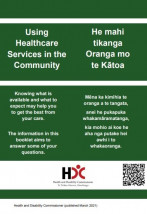
Using healthcare services in the community
Health and Disability Commissioner, NZ
This booklet is for people who are unfamiliar with community healthcare services.
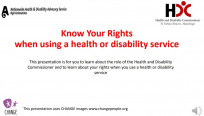
Know your rights when using a health and disability service(external link)(external link)
Health and Disability Commissioner, NZ
This booklet is to learn about the role of the Health and Disability Commissioner and to learn about your rights when you use a health or disability service.
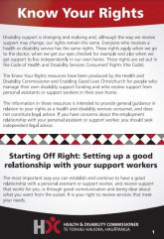
Starting off right – setting up a good relationship with your support workers
Health and Disability Commissioner, NZ
This resource looks at ways you can have a good relationship with your support worker.
Credits: Healthify editorial team. Healthify is brought to you by Health Navigator Charitable Trust.
Page last updated:





